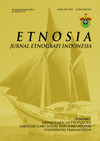‘Tuyul’: Transportasi Onlen Fiktif, Media Sosial dan Hukum
DOI:
https://doi.org/10.31947/etnosia.v3i1.4434Keywords:
online transportation, ‘tuyul’, driver, incentive, law and social media.Abstract
Technology today cannot be denied is developed very rapidly. People compete to innovate and take advantage of this technology development to create something that has economic value. One form of these rapid technology development that is currently being discussed and massively utilised is the presence of online-based application transportation. In Indonesia, there are a number of online-based application transportation companies, one of the most popular companies is Grab. However, this technological advance still have a gap to be cheated by irresponsible people who want to earn money by breaking the rules through modifying android handphone (HP root). Thus, they do not have to bother driving to pick up passengers from place of origin to destination by onlinely ‘playing’ the aplication. In this way, incentives are obtained, something that can only be legally obtained with certain targets of a company with considerable revenue. Both driver ‘tuyul’ and police understand that burglary apllication is a violation of the law. However, there is a symbiotic mutualism between the two. On the one hand, ‘tuyul’ drivers are excempted for the offence committed by paying some money. On the other hand, police also get some money from ‘the release’. Such ‘peaceful arrangement’ can be done only if the case is not exposed to the media, especially social media which release news is much faster and up-to-date. This indicates the significant role of media, not only to expose cases of ’tuyul’ driver, but also to make these cases go into the realm of law. This proves that the media is more respected than the police and money remains a ‘king’ capable of buying the law. Therefore, online trandportation companies should evaluate and improve the security sistem of their application so as not to be easily broken by ‘tuyul’ drivers. In addition, cooperation among Grab companies, police, and media in conducting raids since research findings indicate that media can be a controller in expressing this online-based application transportation crime.Downloads
References
Anindhita, Wiratri; Melisa Arisanty; Devie Rahmawati. (2016). ‘Analis Penerapan Teknologi
Komunikasi Tepat Guna Pada Bisnis Transportasi Online’. Prosiding Seminar Nasional INDOCOMPAC, 2-3 Mei 2016, Universitas Bakrie, Jakarta, 713-728.
Anwar, Ahsani A. (2017). ‘Online vs Konvensional: Keunggulan dan Konflik Antar Moda Transportasi di Kota Makassar’, Etnosia, 2(2):220-246.
Ismail, Ahmad. (2016). Online Social Movement: The Revival of Civil Society in Indonesia. Series: Advances in Social Science, Education and Humanities Research. ISBN 978-94-6252-396-8. ISSN 2352-5398. DOI number doi:10.2991/uicosp-17.2017.28.
Ismail, A. (2017). Tweeting and Click: Internet and New Social Movement in Indonesia. Proceedings of the International Conference on Ethics in Governance (ICONEG 2016). doi:10.2991/iconeg-16.2017.16
Gunawan, Stephen. (2017). ‘Persepsi Konsumen Atas Layanan GrabCar di Surabaya’, Agora, 5(3): 1-10.
Kurniati, Apsari W. (2017). ‘Komunikasi Pemasaran Transportasi Online NuberJEK', Jurnal Komunikasi dan Kajian Media, Oktober, 1(1):69-84.
Go-Jek Indonesia. (2017). Satu Aplikasi Untuk Semua Kebutuhan Anda. https://www.go-jek.com/, diakses tanggal 30 Oktober 2017.
Hidayat, Avid. (2016). Didemo, Manajemen Grab: Kami Legal dan Bayar Pajak. https://bisnis.tempo.co/read/756045/didemo-manajemen-grab-kami-legal-dan-bayar-pajak#mHfIxrTHfpWMSPZX.99, diakses 18 April 2018.
Nirmala, Ronna. (2016). Perang Tarif antara Taksi Konvensional dan Aplikasi. https://beritagar.id/artikel/berita/perang-tarif-antara-taksi-konvensional-dan-aplikasi, diakses 1 November 2017.
Tanamal, Rinabi. (2017). Analisis Faktor Yang Paling Berpengaruh Pada Keinginan Menggunakan Aplikasi Grab Di Kota Surabaya. Surabaya: Universitas Ciputra Uc Town.
https://id.wikipedia.org/wiki/Grab, diakses tanggal 10 Mei 2018.
https://inet.detik.com/law-and-policy/d-3829967/terkuak-motif-driver-grab-antar-tuyul?_ga=2.130448838.899404888.1526784795-990710883.1526784776, diakses tanggal 12 Mei
















1.png)





